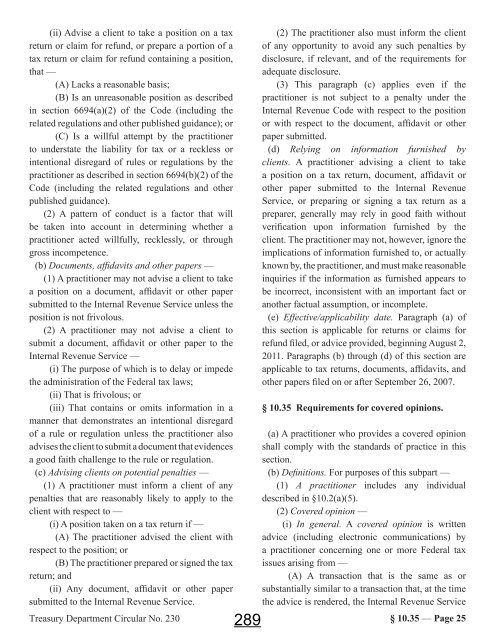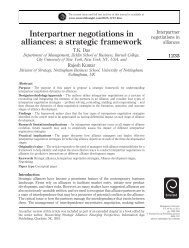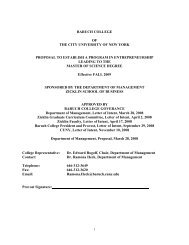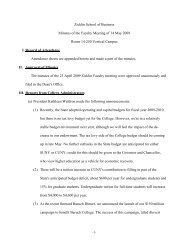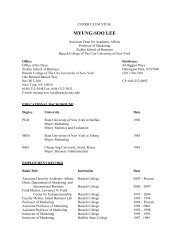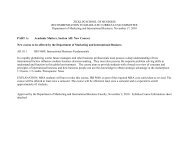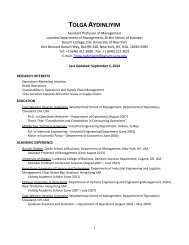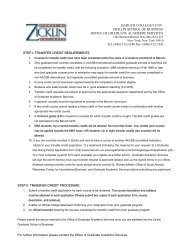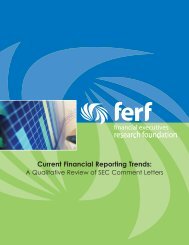Tax Seminar #3 – December 3 2012
Workbook - Zicklin School of Business
Workbook - Zicklin School of Business
You also want an ePaper? Increase the reach of your titles
YUMPU automatically turns print PDFs into web optimized ePapers that Google loves.
(ii) Advise a client to take a position on a tax<br />
return or claim for refund, or prepare a portion of a<br />
tax return or claim for refund containing a position,<br />
that —<br />
(A) Lacks a reasonable basis;<br />
(B) Is an unreasonable position as described<br />
in section 6694(a)(2) of the Code (including the<br />
related regulations and other published guidance); or<br />
(C) Is a willful attempt by the practitioner<br />
to understate the liability for tax or a reckless or<br />
intentional disregard of rules or regulations by the<br />
practitioner as described in section 6694(b)(2) of the<br />
Code (including the related regulations and other<br />
published guidance).<br />
(2) A pattern of conduct is a factor that will<br />
be taken into account in determining whether a<br />
practitioner acted willfully, recklessly, or through<br />
gross incompetence.<br />
(b) Documents, affidavits and other papers —<br />
(1) A practitioner may not advise a client to take<br />
a position on a document, affidavit or other paper<br />
submitted to the Internal Revenue Service unless the<br />
position is not frivolous.<br />
(2) A practitioner may not advise a client to<br />
submit a document, affidavit or other paper to the<br />
Internal Revenue Service —<br />
(i) The purpose of which is to delay or impede<br />
the administration of the Federal tax laws;<br />
(ii) That is frivolous; or<br />
(iii) That contains or omits information in a<br />
manner that demonstrates an intentional disregard<br />
of a rule or regulation unless the practitioner also<br />
advises the client to submit a document that evidences<br />
a good faith challenge to the rule or regulation.<br />
(c) Advising clients on potential penalties —<br />
(1) A practitioner must inform a client of any<br />
penalties that are reasonably likely to apply to the<br />
client with respect to —<br />
(i) A position taken on a tax return if —<br />
(A) The practitioner advised the client with<br />
respect to the position; or<br />
(B) The practitioner prepared or signed the tax<br />
return; and<br />
(ii) Any document, affidavit or other paper<br />
submitted to the Internal Revenue Service.<br />
Treasury Department Circular No. 230<br />
289<br />
(2) The practitioner also must inform the client<br />
of any opportunity to avoid any such penalties by<br />
disclosure, if relevant, and of the requirements for<br />
adequate disclosure.<br />
(3) This paragraph (c) applies even if the<br />
practitioner is not subject to a penalty under the<br />
Internal Revenue Code with respect to the position<br />
or with respect to the document, affidavit or other<br />
paper submitted.<br />
(d) Relying on information furnished by<br />
clients. A practitioner advising a client to take<br />
a position on a tax return, document, affidavit or<br />
other paper submitted to the Internal Revenue<br />
Service, or preparing or signing a tax return as a<br />
preparer, generally may rely in good faith without<br />
verification upon information furnished by the<br />
client. The practitioner may not, however, ignore the<br />
implications of information furnished to, or actually<br />
known by, the practitioner, and must make reasonable<br />
inquiries if the information as furnished appears to<br />
be incorrect, inconsistent with an important fact or<br />
another factual assumption, or incomplete.<br />
(e) Effective/applicability date. Paragraph (a) of<br />
this section is applicable for returns or claims for<br />
refund filed, or advice provided, beginning August 2,<br />
2011. Paragraphs (b) through (d) of this section are<br />
applicable to tax returns, documents, affidavits, and<br />
other papers filed on or after September 26, 2007.<br />
§ 10.35 Requirements for covered opinions.<br />
(a) A practitioner who provides a covered opinion<br />
shall comply with the standards of practice in this<br />
section.<br />
(b) Definitions. For purposes of this subpart —<br />
(1) A practitioner includes any individual<br />
described in §10.2(a)(5).<br />
(2) Covered opinion —<br />
(i) In general. A covered opinion is written<br />
advice (including electronic communications) by<br />
a practitioner concerning one or more Federal tax<br />
issues arising from —<br />
(A) A transaction that is the same as or<br />
substantially similar to a transaction that, at the time<br />
the advice is rendered, the Internal Revenue Service<br />
§ 10.35 — Page 25


